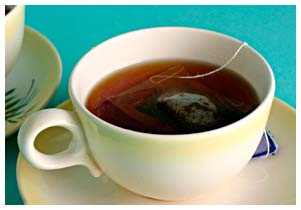Cheap tea bags contain frighteningly high fluoride levels, study shows
Monday, August 05, 2013 - By Jonathan Benson
 A new study published in the journal, Food Research International, has revealed that millions of people across the globe are at serious risk of developing tooth decay, bone loss, and other serious health conditions as a result of over-exposure to fluoride. Many inexpensive, store brand black and green teas, it turns out, contain dangerously high levels of fluoride that far exceed even the government's over-inflated maximums for fluoride exposure.
A new study published in the journal, Food Research International, has revealed that millions of people across the globe are at serious risk of developing tooth decay, bone loss, and other serious health conditions as a result of over-exposure to fluoride. Many inexpensive, store brand black and green teas, it turns out, contain dangerously high levels of fluoride that far exceed even the government's over-inflated maximums for fluoride exposure.
Though it focused mainly on private label tea brands sold in the U.K., the study identified what is presumably a reality in many developed nations -- cheap teas generally contain levels of fluoride so high that drinking them may be considered unsafe. Based on an analysis of 38 different tea brands, Ph.D. student Laura Chan and her colleagues from the University of Derby found that fluoride levels averaged around six milligrams per liter (mg/l) in store brand tea.
The worst offenders were Asda Smartprice, Tesco Value, Morrisons Value, Sainsbury's Basics, and Waitrose Essential -- in the U.S., some equivalent examples would include Kroger Private Selection or GIANT Guaranteed Value (these domestic brands were not tested as part of the study, but are merely examples for illustration purposes). Waitrose Essential, according to the U.K.'s Daily Mail, tested lower for fluoride than the other economy brands, but is still regarded as having high levels of fluoride.
Reputable name brands such as Clipper Organic Leaf, PG Tips, Twining's, Typhoo, Assam, Dilmah, Ceylon, Oolong, and Pu'er, on the other hand, were found to contain far lower levels of fluoride than the store brands, presumably because they contain tea made from younger leaves and stems that are considered to be of a higher quality. Cheaper brands tend to use more mature leaves, which also have the highest accumulative levels of fluoride.
"This study suggests that people drinking economy brands of tea may be exposed to high levels of fluoride, which can cause dental and bone problems," admitted the U.K.'s National Health Service (NHS) in a recent announcement. "The researchers calculate that people drinking one liter (roughly one quart) of cheap tea a day may be consuming more fluoride than the daily recommended amount, as advised by U.S. experts."
Mainstream media finally admits fluoride damages teeth, bones
 An important thing to remember in light of this study is the fact that much of the U.K. does not artificially fluoridate its water supply in the same way that most major metropolitan areas in America currently do. This means that conventional tea in and of itself is a threat to human health, not to mention the additional fluoride load posed by drinking public water and various foods and beverages made with it.
An important thing to remember in light of this study is the fact that much of the U.K. does not artificially fluoridate its water supply in the same way that most major metropolitan areas in America currently do. This means that conventional tea in and of itself is a threat to human health, not to mention the additional fluoride load posed by drinking public water and various foods and beverages made with it.
Though some of the fluoride found in both black and green teas is naturally-occurring calcium fluoride, which is safe in trace amounts, much of it is likely sodium fluoride and other synthetic fluoride chemicals that result from aluminum mining and phosphate fertilizer production. These fluoride chemicals, as copiously documented by fluoride truth groups like the Fluoride Action Network (FAN), are a serious threat to health, especially when compounded by multiple consumption routes.
"Although fluoride is considered an essential micro-nutrient for human health ... excess fluoride in the diet can have detrimental effects," add the researchers. "Dental fluorosis, the mottling of tooth enamel, and skeletal fluorosis, pain and damage to bones and joints through calcification, can occur."
To learn more about the dangers of fluoride, be sure to check out the work of FAN:
http://www.fluoridealert.org
Sources for this article include:
http://www.dailymail.co.uk
http://www.nhs.uk
http://www.sciencedaily.com
http://www.fluoridealert.org
http://science.naturalnews.com


